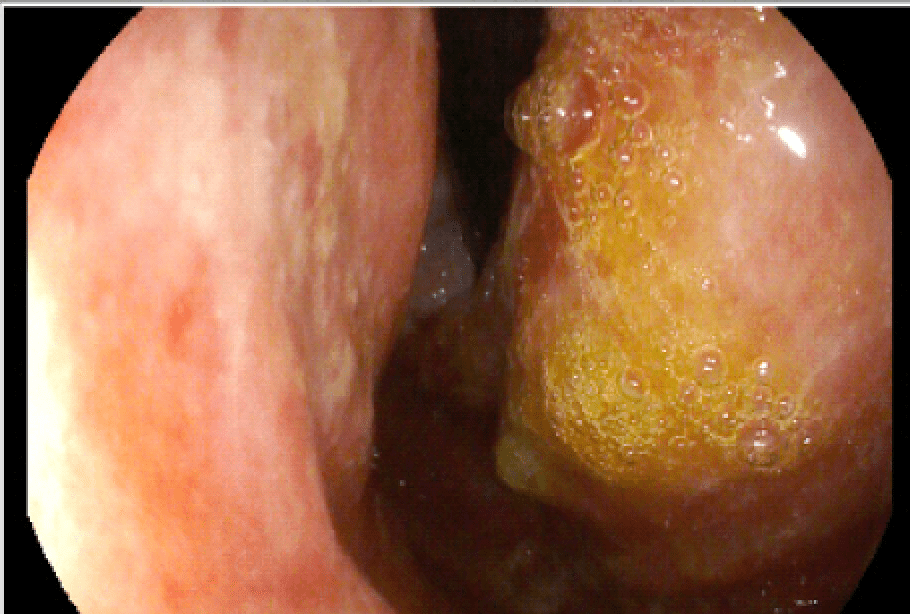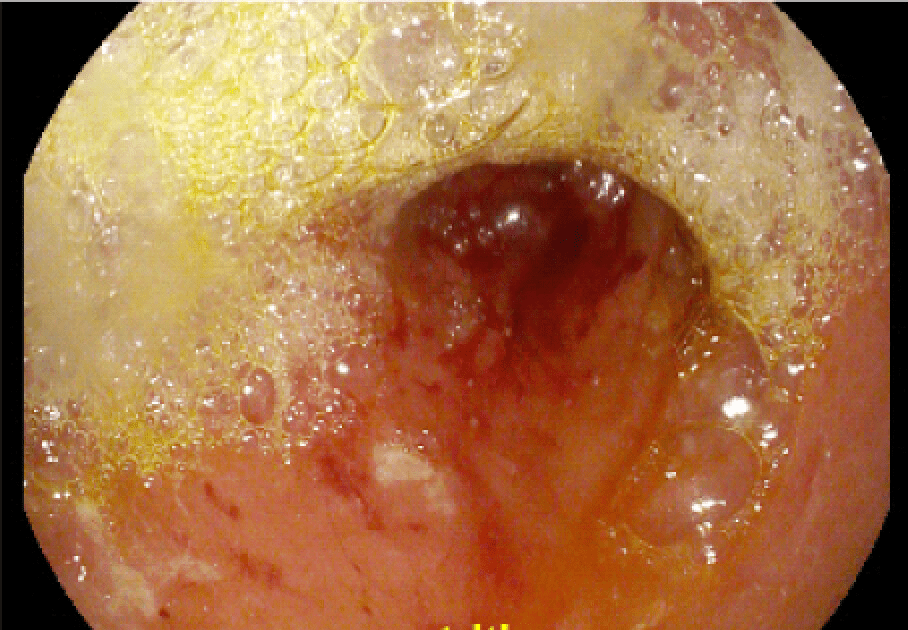Tuesday Poster Session
Category: Infections and Microbiome
P5593 - CMV Gastritis Following Pembrolizumab in Stage IV Renal Cell Carcinoma: Importance of Early PCR and Biopsy for Timely Diagnosis
Tuesday, October 28, 2025
10:30 AM - 4:00 PM PDT
Location: Exhibit Hall

Sufiyan Kamal, MD
University of Texas Health East Texas Physicians
Tyler, TX
Presenting Author(s)
Sufiyan Kamal, MD, Bixuan Lin, MD
University of Texas Health East Texas Physicians, Tyler, TX
Introduction: Pembrolizumab, a PD-1 immune checkpoint inhibitor, is widely used in the treatment of many advanced malignancies, including renal cell carcicoma. Gastrointestinal immune-related adverse events (GI-irAEs) such as colitis are common, while upper GI manifestations like gastritis are rare. Cytomegalovirus (CMV) gastritis can mimic ICI-induced gastritis clinically and endoscopically, and if misdiagnosed, treatment with immunosuppressants can worsen outcomes. We present a case that shows the importance of early gastric biopsy and serum CMV PCR testing in distinguishing CMV gastritis from ICI-related gastritis in patients receiving pembrolizumab.
Case Description/
Methods: A 64-year-old woman with stage IV clear cell renal cell carcinoma receiving pembrolizumab presented with epigastric pain, nausea, vomiting, and anorexia following her third treatment cycle. Initial evaluation raised concern for immune checkpoint inhibitor (ICI)-related gastritis, and the patient was started on intravenous steroids. Due to persistent symptoms, he was also administered a single infliximab infusion. An esophagogastroduodenoscopy (EGD) revealed diffuse gastritis with erythema, loss of gastric folds, and friable sloughing mucosa. Biopsies sent for CMV staining demonstrated CMV-positive immunohistochemistry; H. pylori was negative. Positive laboratory findings included detectable CMV PCR, positive CMV IgG, and elevated CMV IgM, consistent with active CMV gastritis. Upon confirmation, infliximab was discontinued, steroids were tapered, and the patient was transitioned to IV ganciclovir followed by oral valganciclovir. She remained on omeprazole 40 mg twice daily. She showed significant clinical improvement and was followed up in the GI clinic for ongoing surveillance.
Discussion: This case demonstrates the challenge of distinguishing ICI-induced gastritis from CMV gastritis, as both can present with similar upper GI symptoms and endoscopic findings. ICI including Pembrolizumab, while effective in treating advanced malignancies, can cause CMV reactivation occurs due to impaired T-cell–mediated immunity. Initiating immunosuppression without a definitive diagnosis may exacerbate viral disease. In ICI-treated patients with gastritis symptoms, early biopsy with CMV staining should be considered.

Figure: Endoscopic image demonstrating erythematous and edematous gastric mucosa

Figure: Endoscopic image showing inflamed gastric mucosa with yellowish exudate and frothy secretion
Disclosures:
Sufiyan Kamal indicated no relevant financial relationships.
Bixuan Lin indicated no relevant financial relationships.
Sufiyan Kamal, MD, Bixuan Lin, MD. P5593 - CMV Gastritis Following Pembrolizumab in Stage IV Renal Cell Carcinoma: Importance of Early PCR and Biopsy for Timely Diagnosis, ACG 2025 Annual Scientific Meeting Abstracts. Phoenix, AZ: American College of Gastroenterology.
University of Texas Health East Texas Physicians, Tyler, TX
Introduction: Pembrolizumab, a PD-1 immune checkpoint inhibitor, is widely used in the treatment of many advanced malignancies, including renal cell carcicoma. Gastrointestinal immune-related adverse events (GI-irAEs) such as colitis are common, while upper GI manifestations like gastritis are rare. Cytomegalovirus (CMV) gastritis can mimic ICI-induced gastritis clinically and endoscopically, and if misdiagnosed, treatment with immunosuppressants can worsen outcomes. We present a case that shows the importance of early gastric biopsy and serum CMV PCR testing in distinguishing CMV gastritis from ICI-related gastritis in patients receiving pembrolizumab.
Case Description/
Methods: A 64-year-old woman with stage IV clear cell renal cell carcinoma receiving pembrolizumab presented with epigastric pain, nausea, vomiting, and anorexia following her third treatment cycle. Initial evaluation raised concern for immune checkpoint inhibitor (ICI)-related gastritis, and the patient was started on intravenous steroids. Due to persistent symptoms, he was also administered a single infliximab infusion. An esophagogastroduodenoscopy (EGD) revealed diffuse gastritis with erythema, loss of gastric folds, and friable sloughing mucosa. Biopsies sent for CMV staining demonstrated CMV-positive immunohistochemistry; H. pylori was negative. Positive laboratory findings included detectable CMV PCR, positive CMV IgG, and elevated CMV IgM, consistent with active CMV gastritis. Upon confirmation, infliximab was discontinued, steroids were tapered, and the patient was transitioned to IV ganciclovir followed by oral valganciclovir. She remained on omeprazole 40 mg twice daily. She showed significant clinical improvement and was followed up in the GI clinic for ongoing surveillance.
Discussion: This case demonstrates the challenge of distinguishing ICI-induced gastritis from CMV gastritis, as both can present with similar upper GI symptoms and endoscopic findings. ICI including Pembrolizumab, while effective in treating advanced malignancies, can cause CMV reactivation occurs due to impaired T-cell–mediated immunity. Initiating immunosuppression without a definitive diagnosis may exacerbate viral disease. In ICI-treated patients with gastritis symptoms, early biopsy with CMV staining should be considered.

Figure: Endoscopic image demonstrating erythematous and edematous gastric mucosa

Figure: Endoscopic image showing inflamed gastric mucosa with yellowish exudate and frothy secretion
Disclosures:
Sufiyan Kamal indicated no relevant financial relationships.
Bixuan Lin indicated no relevant financial relationships.
Sufiyan Kamal, MD, Bixuan Lin, MD. P5593 - CMV Gastritis Following Pembrolizumab in Stage IV Renal Cell Carcinoma: Importance of Early PCR and Biopsy for Timely Diagnosis, ACG 2025 Annual Scientific Meeting Abstracts. Phoenix, AZ: American College of Gastroenterology.

